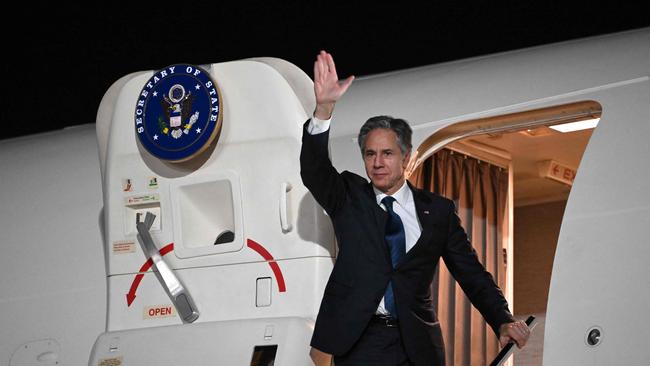Washington in direct talks with the former Al-Qa’ida faction that toppled Assad
The US is in direct contact with Hayat Tahrir al-Sham, the Islamist rebel group that led the overthrow of Bashar al-Assad in Syria

The US is in direct contact with Hayat Tahrir al-Sham, the Islamist rebel group that led the overthrow of Bashar al-Assad in Syria, and is communicating Washington’s hope that a transitional government can quickly establish security and prevent the country from descending into chaos.
US Secretary of State Antony Blinken, in the region to build support for Syria’s future following the surprise fall of the regime last weekend, said those direct communications with HTS, as it is known, and other groups inside Syria are also focused on urging them to find the American journalist Austin Tice. He was captured more than 12 years ago and held in territory controlled by the regime. Tice’s status is unknown, but the US is now using the fall to seek his safe return home.
“Yes, we have been in contact with HTS and with other parties,” Blinken told reporters here Saturday. “Our message to the Syrian people is this: We want them to succeed and we’re prepared to help them do so.” HTS, a US-designated terrorist organisation, has distanced itself from the jihadists and worked to crack down on extremists in its midst.
A central concern for the US and regional leaders is that Islamic State might seek to exploit the political transition in Syria to retake territory and even threaten neighbouring Iraq. The US is also working to curtail the influence of Russia and of Iran, once a key Assad ally.
Blinken spoke following a meeting of leaders of eight Arab nations who met here Saturday.
In a statement after talks here, foreign ministers from Jordan, Iraq, Saudi Arabia, Egypt, Lebanon, the United Arab Emirates, Bahrain and Qatar said they had agreed to “support a peaceful transition process” in Syria “in which all political and social forces are represented,” but left many questions unanswered.
Throughout his visit — which included stops in Jordan, Iraq and Turkey — Blinken has emphasised the need for Syria’s neighbours to support a government that is for Syria and by Syrians.
Blinken’s plan is predicated on some key principles, including human rights of minorities and women, a focus on humanitarian operations to help the people of Syria and building a transition government that would prevent the country from becoming a base from which terrorist groups could operate.
The US has also emphasised the need to secure or destroy the chemical weapons stockpiles that were kept at sites across the country under the Assad regime.
Blinken said this week that creating consensus on all of the US principles would require the help of friendly countries in the region who are willing to support the transitional government.
One of the crucial issues for the US is to ensure stability in northeast Syria for the US-backed Kurdish forces who are fighting Islamic State and guarding tens of thousands of former Islamic State fighters and their families being held in detention facilities there.
An existing deal between Turkish and Kurdish forces, two longtime foes, aims at preventing clashes near the northern city of Manbij. But US officials are seeking additional assurances from both sides that a wider conflict pitting the Kurds against pro-Turkish rebels won’t broaden in the region. Kurdish forces agreed to begin flying the new Syrian red-green-and-black flag, now with three stars on it instead of the regime’s two-star banner.
In Baghdad on Friday, Blinken told Iraqi Prime Minister Mohammed Shia Al Sudani that a weakened Iran presented an opportunity for Baghdad to distance itself from Tehran, according to a US official. US officials have long pushed Iraq to crack down on Iranian-aligned groups.
Blinken was in Aqaba as part of a broader summit that also included the Arab League, the European Union and Turkey to discuss plans and goals to assist Syria’s transition to a new government succeeding the deposed government of Assad.
Arab and European diplomats say they are discussing a transition toward a civilian government in Syria that would replace the former rebels now in control, in exchange for lifting sanctions from the US and others, and providing much needed financial assistance.
In a joint statement, the US and the European and Arab nations dealing with Syria called for a representative government there based on the principles of the United Nations Security Council resolution 2254. The 2015 resolution initially demanded Assad share power with the opposition.
With the dictator now gone, diplomats are looking at legal ways to rely on the text of the resolution without having to go through another vote — which they say would delay a swift transition to civilian rule.
The joint statement also demanded that “Syrian territory does not pose a threat to any country, or a shelter to terrorists.” Regional nations in particular remain far apart on what sort of actor should replace the new administration dominated by former rebels. Jordan, Lebanon and the United Arab Emirates, who were friendly to Assad, want to ensure Islamists won’t dominate any coming transitional government as they fear resurgent extremism in the region, Arab diplomats said. Turkey, Qatar and Saudi Arabia are more flexible on HTS playing a role in the new administration, they said.
To mend fences, Turkey has reached out to the government in Beirut, promising it would ensure the former rebels and their jihadist allies wouldn’t try to penetrate Lebanon or attack minorities in Syria, Lebanese diplomats said. Lebanon is home to large populations of Christians and members of the Shia sect of Islam, which are minorities in Syria and frequently targeted by extremists there.
The Wall Street Journal



To join the conversation, please log in. Don't have an account? Register
Join the conversation, you are commenting as Logout